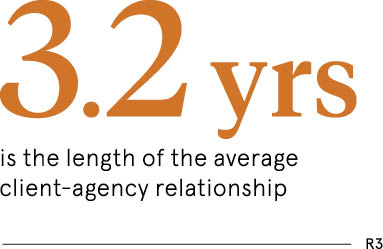Marketing chiefs are now making as many technical decisions as marketing calls, according to Michael Kassan, chairman and chief executive of media advisory business Medialink. “They can’t just identify a good storyline; they have to match it up with the data and technology, and deliver it,” he says. To this end, it is no longer enough for partner agencies to develop a strong narrative and produce great creative; they also need to advise brands on the data that informs the concept, as well as the right platform and metrics.
As Joy Bhattacharya, UK and Ireland managing director at Accenture’s agency wing Accenture Interactive, says: “The lines are blurring as the need to offer creative, technology, design and consulting within the same four walls becomes more of an imperative. Everyone, whether agency or consultancy, is approaching it in different ways to provide a holistic solution. Chief marketing officers (CMOs) now have the chance to think in a different way about what those goals could be, which will be very empowering.”
Sam Garrity, managing director at digital marketing agency RocketMill, says digital is no longer a channel; it is the way all channels are now traded. “We will eventually be able to buy almost all media inventory digitally, at which point we will not segment agencies like we do today, with specialist digital agencies. We, agencies, are all heading in a similar direction and I believe that the digitally native agencies will get there first.”
Agencies must be trustworthy
That direction involves, crucially, more closely reflecting the needs of the brand. As Mr Kassan says: “Agencies need to further their client’s business needs and strategic imperatives, not those of the agency.”
Much of it comes down to trust. Nina Bibby, CMO at O2, says: “We need to be able to implicitly trust our agencies to always have our best interests at heart and that trust comes from honest relationships. It goes without saying that agencies need to be agile and adaptable to the seismic change the industry is going through.”
Agencies need to be agile and adaptable to the seismic change the industry is going through
Publicis Media is shifting from pure-play communications partner to “experts in transformation”, says Sue Frogley, the company’s chief executive. “Or to put it another way, we are transforming ourselves from being a holding-group business to a platform business,” she says. It means breaking up the divides between data, creativity and technology, and “smashing the old silos to become a more agile, flat and dynamic organisation”.
A key part of this change in direction for agencies is collaboration. As Mr Kassan says: “It’s about finding strange bedfellows. You can no longer be precious about who you collaborate with.”
Agencies should highlight their strategic capabilities
Cheryl Calverley, marketing director at the AA, says the motoring organisation tends to rely on a few core agencies, occasionally supported by much smaller specialist agencies, which enables the AA to remain nimble and innovative.
But Ms Calverley is vocal about agencies being caught out by the disaggregation of channels and content. “Mainly, and primarily, it has reiterated that strong, clear and consistent brand identity and strategy is absolutely core, and agencies that can evolve, challenge and then create powerful work to this end will succeed,” she says.

Indeed, Mr Kassan believes that agencies must break out of being classed as simply tactical and transactional, and instead shout about their strategic capabilities. “They are strategic organisations with deep talent resources and they are to be trusted, but they have to remind the client and restore that trust,” he says.
Ms Frogley also urges agencies to be confident in the benefits they offer brands. She points out: “We are the marketing experts and we will be in the future too because we are the pioneers of change, but we must not be complacent.”
Arguably, it is the huge focus on technology that has encouraged many agencies to neglect the more strategic side of their offering. Ms Calverley says: “Media agencies have been buffeted hard by procurement and last-click attribution, and have in many cases resorted to ‘pile it high, sell it cheap’ media strategies, which are ultimately ineffective in brand building.”
Reliance on data should not impair creativity
It is clear technology will continue to play an integral part in marketing, and that the marriage between data and creativity is hugely important. “Data scientists and creatives not only need to work together, they need to be underpinned by a method that everyone involved can use the insights to create great outcomes,” says Mr Bhattacharya.
But Mr Garrity offers a word of caution: “If we lean too heavily on data, we may seek to mitigate all risk, preventing the bravery and left-field thinking that results in a drumming gorilla or surfing horses.”
If we lean too heavily on data, we may seek to mitigate all risk, preventing the bravery and left-field thinking that results in a drumming gorilla or surfing horses
As agencies continue on their journey, life for brands looks simpler and perhaps fairer. Mr Bhattacharya says Accenture Interactive focuses on joining up the silos to deliver connected experiences, underpinned by a commercial model linking fees to outcomes. “For example, where we get paid on number of cars sold or hotel rooms booked,” he says.
Mr Garrity believes such outcome-based agreements will become commonplace. He concludes: “Agencies will need to share the risk with brands, being rewarded fairly when they win, but sharing the bad times too. This alone will align the interests of both brand and agency, forging a genuine collaboration in the process.”
